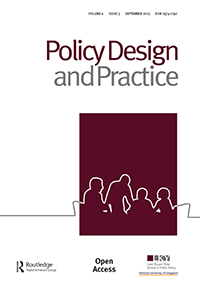The societal impact puzzle: a snapshot of a changing landscape across education and research
IF 2.6
Q1 PUBLIC ADMINISTRATION
引用次数: 6
Abstract
Abstract The term ‘impact’ is everywhere. Organizations and individuals want to fund projects for impact, measure impact, and showcase the impact of effort, expertise and financial investment, but clear definitions and understandings of what having an impact really means for people and institutions appear lacking or ad-hoc. This paper explores ‘impact’ in the areas of education and research into government practice. For governments, the impact agenda involves operating in increasingly tight fiscal environments with mounting pressure to articulate and demonstrate return on investment. For education providers, there are increasing calls to justify and prove why investment in education is an efficient and effective endeavor. For universities, this includes a shift from a traditional publication-focused research impact culture to a wider societal impact one that demonstrates direct and indirect benefits to society. This paper conceptualizes impact as a “puzzle” with many pieces, with education and research making up key pieces that can and need to fit together better. In doing so, the paper identifies four problem areas to help guide thinking toward clarity about what ‘impact’ entails. To aid collective progress in this space, we detail key issues facing the education and research sectors. Based on our analysis we arrive at a set of questions intended to help guide thinking and actions toward collectively increasing the ability to generate and demonstrate the impact of both into government practice and society at large.社会影响之谜:教育和研究领域不断变化的景象的快照
摘要“影响”一词无处不在。组织和个人希望为项目的影响力提供资金,衡量影响力,并展示努力、专业知识和金融投资的影响力,但对影响力对人们和机构的真正意义似乎缺乏明确的定义和理解,或者是临时的。本文探讨了教育和政府实践研究领域的“影响”。对政府来说,影响议程涉及在日益紧缩的财政环境中运作,阐明和展示投资回报的压力越来越大。对于教育提供者来说,越来越多的人呼吁证明和证明为什么教育投资是一项高效和有效的努力。对于大学来说,这包括从传统的以出版物为重点的研究影响文化转变为更广泛的社会影响文化,这种文化展示了对社会的直接和间接利益。本文将影响概念化为一个由多个部分组成的“谜题”,教育和研究构成了可以而且需要更好地结合在一起的关键部分。在这样做的过程中,论文确定了四个问题领域,以帮助引导人们思考清楚什么是“影响”。为了帮助在这一领域取得集体进展,我们详细介绍了教育和研究部门面临的关键问题。基于我们的分析,我们得出了一系列问题,旨在帮助指导思维和行动,共同提高产生和展示其对政府实践和整个社会影响的能力。
本文章由计算机程序翻译,如有差异,请以英文原文为准。
求助全文
约1分钟内获得全文
求助全文
来源期刊

Policy Design and Practice
PUBLIC ADMINISTRATION-
CiteScore
10.30
自引率
4.30%
发文量
19
审稿时长
13 weeks
期刊介绍:
 求助内容:
求助内容: 应助结果提醒方式:
应助结果提醒方式:


